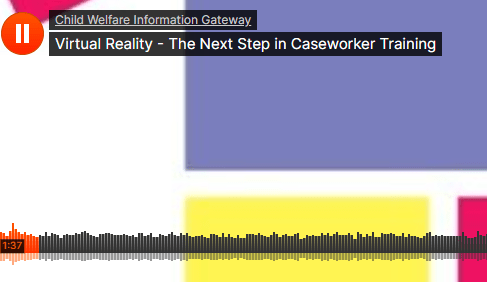Episode 43: Virtual Reality – The Next Step of Caseworker Training podcast
To say you know something is totally different than your ability to do something in and what we are starting to get into here is testing the ability to do something. -Matt Davis, research associate professor, University of Utah College of Social Work
The need for training continues across child welfare, but students and new caseworkers still can benefit from practicing the skills required for casework after their classroom sessions have ended. This episode discusses a virtual reality-based home visiting training currently being used by the university’s B.S.W. students Virtual Home Simulation (VHS) which was developed by the University of Utah College of Social Work in partnership with the university’s games and applications lab. While other online trainings exist, the developers of the VHS training point to the following features that set it apart from other simulation-based trainings:
Develops skills on identifying both risk and protective factors
Provides a 360-degree view of a home
Includes detailed user tracking to monitor students’ progress and skills development
Uses an algorithm that incorporates expert jurisdiction-specific feedback to coach students on how expert home visitors would perform
The following individuals are featured in this episode:
Chad McDonald, research assistant professor, University of Utah College of Social Work
Matt Davis, research associate professor, University of Utah College of Social Work
Topics discussed include the following:
How Utah’s Department of Children and Family Services consulted on the curricula and development
The application of multimedia learning and direct practice learning theories within VHS
Why realistic photos are preferred over animation in home visiting simulations
Using collective wisdom over stressing “correct answers”
Initial results of VHS, as reported by the university
The future of virtual reality training for caseworkers

